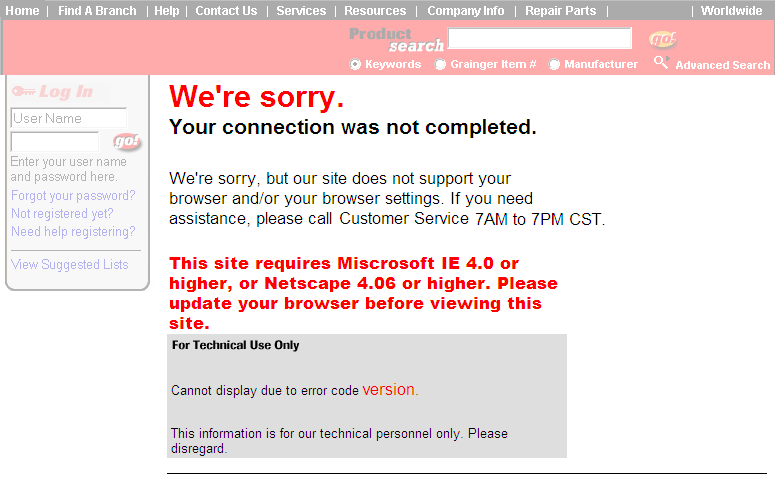
I am the chair of the HTML working group, an international group of people from companies like Microsoft, Netscape, various telecom companies, etc, who under the auspices of the World Wide Web Consortium are responsible for designing new versions of HTML.
It should come as no surprise then that I surf the web with the newest of the new browsers, such as Mozilla, Opera, Galeon, Konqueror, etc. Not only with new browsers, but also with new computers, laptops, PDAs, telephones, and so on. It is consequently quite amusing when I am greeted by a website that tells me that my browser is terribly out of date, and that I should uprade to Netscape 4 or Internet Explorer 5... Well, it was amusing the first time, but I find it rather sad really, offensive even. It is extraordinary how many web sites are unable to deal with more than just one or two standard browsers on a standard computer.
There are three sorts of faulty sites. The first, and least problematic, are those that announce something like "Best viewed at 800x600, with 16 bit colour, and browser such-and-so". And if I haven't got 800x600 pixels then? Do I have to buy a new computer? These sites are the fault of graphic designers who are used to designing for paper, with its fixed sizes and formats, but haven't yet learnt 'fluid design' where the content fills the window, regardless of its size of format.
The second sort of faulty site is where something just doesn't work. You click on a button, and nothing happens. These are the fault of programmers who think that there are only two browsers in the world and look at the name of the browser, and decide that if it isn't the one, it must be the other. In fact they ought to be looking at the properties of the browser rather than the name in order to decide how to address it.
The third, and worst, type of faulty site is where you get confronted with the message "you are using the wrong browser; you can't come in". That it is more important to them that I not see their stupid site, rather than see it with a browser they don't know seems incredible to me. It has certainly lost certain sites money, since I have just gone to the competitor and bought there.
My reaction when I see such sites is that the producers are incompetent. It is trivial to make a site that works on all browsers. It is more work to make one that doesn't work on all browsers, but I assume they do it for a flashier effect. Why they don't go the extra mile to make it work again on all browsers is beyond me.
There are people who think that the browser wars are over. In fact we are just in a lull. There are many new sorts of computer about to be released, and I count at least 20 new browsers on the way, many of them embedded in devices.
If website builders don't start learning how to deal with diversity, they will soon be missing lots of people.
© Copyright Steven Pemberton, Amsterdam, 2002. All rights reserved.
First published in ACM/Interactions, July 2002